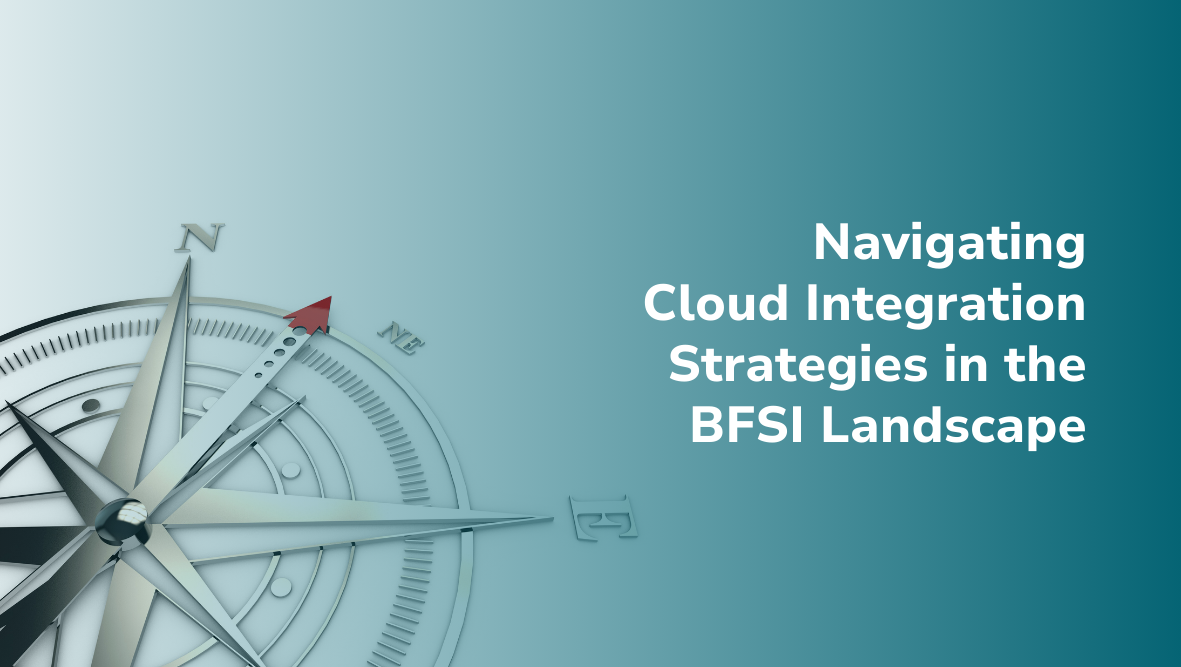For the contemporary BFSI sector, cloud integration is not a luxury but a strategic imperative. While operational efficiency, cost reduction, and scalability are tangible benefits, the intricate journey of integration is layered with complexities. This article is designed as a strategic compass for members of the BFSI sector, offering in-depth insights, pragmatic strategies, and a forward-looking perspective on cloud integration.
Security and Compliance – A Dual Mandate
The Complexity:
In the delicate balance between innovation and security, BFSI companies are tasked with ensuring data integrity while fostering technological advancement. This challenge is compounded by the difficulty of integrating open APIs and modern data platforms with existing legacy technologies.
The Strategy:
Risk Assessment: Employ advanced risk assessment tools and methodologies to identify potential vulnerabilities.
Customized Security Protocols: Develop tailored security protocols leveraging AI and machine learning for enhanced data protection.
Regulatory Alignment: Ensure that cloud integration is in harmony with regulatory norms, employing real-time compliance monitoring tools like Core Stack and other advanced tools.
Technological Synergy – Bridging the Old and the New
The Complexity:
Integrating legacy systems with state-of-the-art cloud platforms is a narrative of technological synergy. The challenge lies in ensuring seamless integration that amplifies operational efficiency without compromising security.
The Strategy:
System Audit: Conduct a comprehensive audit to identify systems ripe for integration and modernization.
Integration Blueprint: Develop a detailed blueprint outlining the integration process, timelines, and expected outcomes.
Performance Metrics: Establish metrics to monitor and measure the performance and efficiency of integrated systems.
Open APIs: Create systems that are compatible with open APIs to easily integrate legacy applications with newer cloud platforms.
Data Management and Analytics – Turning Data into Insights
The Complexity:
The BFSI sector is inundated with data. The challenge and opportunity lie in harnessing this data, turning it into actionable insights that drive informed decision-making.
The Strategy:
Data Assessment: Evaluate the existing data management protocols, identifying areas for enhancement.
Cloud-based Analytics: Leverage cloud-based analytics tools to derive insights, fostering informed decision-making.
Data Governance: Establish robust data governance protocols ensuring data integrity, privacy, and compliance.
Future-Proofing the BFSI Sector – A Forward-Looking Perspective
The Complexity:
The technological landscape is in perpetual evolution. For BFSI CXOs, the task is not just to navigate the present but to future-proof the sector, ensuring adaptability and resilience amidst technological advancements.
The Strategy:
Innovation Labs: Establish innovation labs to explore and integrate emerging technologies like blockchain and AI.
Strategic Alliances: Forge alliances with tech giants and innovators to stay abreast of technological advancements.
Talent Development: Invest in talent development, ensuring that the workforce is equipped to navigate and leverage technological innovations by using the right platforms and tools like selecting futuristic cloud, data, and integration platforms.
As BFSI CXOs navigate the intricate journey of cloud integration, strategic insights and actionable plans are their compass. Each step, from security to technological integration, data management, and future-proofing the sector, is a narrative of strategic mastery.
In this narrative, 3i Infotech emerges as a partner equipped not just with tools and technologies but with insights, expertise, and a commitment to navigating the BFSI sector through the uncharted terrains of cloud integration. It stands as a beacon, illuminating the path with precision, ensuring that cloud integration is not a journey but a strategic conquest.

